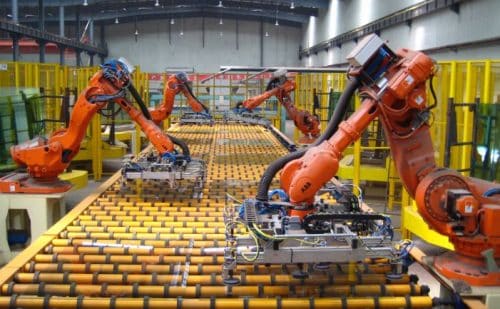Manufacturing is the process or business of producing goods in large numbers in factories. Manufacturing commonly employs a human-machine setup with division of labor. It is the process of converting parts, components, and raw materials into finished products. The finished goods meet consumers’ specifications or expectations.
A company that converts raw materials into finished products is a manufacturer. We can also use the term ‘manufacturer’ for a person if he or she owns a factory or is one of their executives.
The verb ‘to manufacture‘ means to make something using machinery on a large scale.
National GearRepair.com, which specializes in gearbox repair, has the following definition of the term:
“Manufacturing refers to the creation of goods by hand or machine – the finished goods are sold to a customer. Manufacturers use raw materials or various components of a larger product.”
“Typically, the manufacturing process involves skilled labor and a large-scale production line.”
Beyond merely producing goods, modern manufacturing integrates innovative technologies and sustainable practices to meet the evolving demands of global markets.
A wide range of human activities
The word comes from the Latin ablative of ‘Manu,’ which means ‘hand,’ + ‘Factura,’ which means ‘a working,’ from the past participle stem of the Latin word ‘Facere,’ meaning ‘to perform.’
The term may refer to a wide range of activities, from handicraft to high tech.
However, most people use it when talking about industrial production. Specifically, when the manufacturer transforms raw materials into finished goods on a large scale. In this context, the word ‘goods‘ refers to ‘products.’

Manufacturing engineering
Manufacturing engineering or manufacturing process are the steps through which raw materials are converted into finished goods.
The process starts off with the product design as well as materials specification from which the good is made. The manufacturer then modifies these materials through manufacturing processes until they become the required part.
According to Wikipedia:
“Modern manufacturing includes all intermediate processes required in the production and integration of a product’s components. Some industries, such as semiconductor and steel manufacturers use the term fabrication instead.”
Famous manufacturers
North America’s most famous manufacturers are General Electric, Procter & Gamble, Pfizer, Boeing, and General Motors Corporation.
Europe’s most famous manufacturers include Siemens, FCA, Michelin, Volkswagen Group, Unilever, GlaxoSmithKline, and Rio Tinto.
In Asia, the largest manufacturers are Toyota Group, Samsung Electronics, Hon Hai Precision Industry, Honda, SAIC Motor, and Tata Motors.
Quotes
James Dyson, a British investor, industrial design engineer, and founder of the Dyson company, once said: “Manufacturing is more than just putting parts together. It’s coming up with ideas, testing principles and perfecting the engineering, as well as final assembly.”
Tim Cook, an American business executive and industrial engineer who is CEO of Applic Inc., once said: “The right focus for the U.S. is on advanced manufacturing – something that requires innovation.”
The intricacies of manufacturing processes often require a collaborative effort between engineers, machine operators, and quality assurance teams to ensure efficiency and product excellence.
Manufacturing – vocabulary & example sentences
There are many terms in the English language related to “manufacturing”, especially compound nouns. A compound noun is a term that consists of two or more words – “lean manufacturing” is an example. Here are seven such compound nouns, their meanings, and examples of how we can use them in a sentence:
Definition: A systematic method for waste minimization within a manufacturing system without sacrificing productivity.
Example: “The company implemented lean manufacturing techniques to improve efficiency and reduce costs.”
Definition: A system for ensuring that products are consistently produced and controlled according to quality standards.
Example: “Our facility adheres to good manufacturing practice guidelines to ensure the safety and quality of our pharmaceutical products.”
Definition: The relocation of a company’s manufacturing process to a foreign country, often to reduce labor costs.
Example: “To capitalize on lower labor costs, the company decided to explore offshore manufacturing options.”
The process of creating objects by adding material layer by layer, which is commonly referred to as 3D printing.
Example: “Additive manufacturing has revolutionized prototyping, allowing for rapid testing of new product designs.”
A process of removing material from a solid block, such as metal or plastic, to form an object.
Example: “Subtractive manufacturing remains crucial for precision engineering where the material integrity is paramount.”
-
Flexible Manufacturing System (FMS)
A manufacturing system that allows for a quick changeover to adapt to the production of different products at minimal costs.
Example: “The automotive industry benefits significantly from flexible manufacturing systems to meet varied consumer demands.”
-
Custom Manufacturing
The production of goods according to individual customer specifications and requirements.
Example: “Custom manufacturing enables the company to offer personalized solutions to niche market segments.”
Two Educational Videos
These two interesting video presentations, from our sister YouTube channel – Marketing Business Network, explain what ‘Manufacturing’ and ‘Good Manufacturing Practice’ are using simple, straightforward, and easy-to-understand language and examples.
-
What is Manufacturing?
-
What is Good Manufacturing Practice (GMP)?
